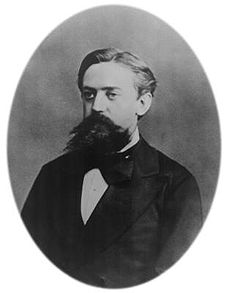- Andrey Markov
-
For other people named Andrey Markov, see Andrey Markov (disambiguation).
Andrey (Andrei) Andreyevich Markov 
Born June 14, 1856 N.S.
Ryazan, Russian EmpireDied July 20, 1922 (aged 66)
Petrograd, Russian SFSRResidence Russia Nationality Russian Fields Mathematician Institutions St Petersburg University Alma mater St Petersburg University Doctoral advisor Pafnuty Chebyshev Doctoral students Abram Besicovitch
Georgy Voronoy
Jacob TamarkinKnown for Markov chains; Markov processes Andrey (Andrei) Andreyevich Markov (Russian: Андре́й Андре́евич Ма́рков) (June 14, 1856 N.S. – July 20, 1922) was a Russian mathematician. He is best known for his work on theory of stochastic processes. A primary subject of his research later became known as Markov chains.
He and his younger brother Vladimir Andreevich Markov (1871–1897) proved Markov brothers' inequality. His son, another Andrey Andreevich Markov (1903–1979), was also a notable mathematician, making contributions on constructive mathematics and recursive function theory.
Contents
Biography
Andrey Andreyevich Markov was born in Ryazan as the son of the secretary of the public forest management of Ryazan, Andrey Grigorevich Markov, and his first wife Nadezhda Petrovna Markova.
In the beginning of the 1860s Andrey Grigorevich moved to St. Petersburg to become an asset manager of the princess Ekaterina Aleksandrovna Valvatyeva.
In 1866 Andrey Andreevich's school life began with his entrance into St. Petersburg's fifth grammar school. Already during his school time Andrey was intensely engaged in higher mathematics. As a 17-year-old grammar school student he informed Bunyakovsky, Korkin and Yegor Zolotarev about an apparently new method to solve linear ordinary differential equations and was invited to the so-called Korkin Saturdays, where Korkin's students regularly met. In 1874 he finished the school and began his studies at the physico-mathematical faculty of St. Petersburg University.
Among his teachers were Yulian Sokhotski (differential calculus, higher algebra), Konstantin Posse (analytic geometry), Yegor Zolotarev (integral calculus), Pafnuty Chebyshev (number theory, probability theory), Aleksandr Korkin (ordinary and partial differential equations), Okatov (mechanism theory), Osip Somov (mechanics) and Budaev (descriptive and higher geometry).
In 1877 he was awarded the gold medal for his outstanding solution of the problem "About Integration of Differential Equations by Continuous Fractions with an Application to the Equation
 " In the following year he passed the candidate examinations and remained at the university to prepare for the lecturer's position.
" In the following year he passed the candidate examinations and remained at the university to prepare for the lecturer's position.In April 1880 Markov defended his Master's thesis "About Binary Quadratic Forms with Positive Determinant", which was encouraged by Aleksandr Korkin and Yegor Zolotarev.
Five years later, in January 1885, there followed his doctoral thesis "About Some Applications of Algebraic Continuous Fractions".
His pedagogical work began after the defense of his Master's thesis in autumn 1880. As a privatdozent he lectured on differential and integral calculus. Later he lectured alternately on "introduction to analysis", probability theory (succeeding Chebyshev who had left the university in 1882) and calculus of differences. From 1895/96 until 1905 he also lectured on differential calculus.
One year after the defense of his doctoral thesis, he was appointed extraordinary professor (1886) and in the same year he was elected adjunct to the Academy of Sciences. In 1890, after the death of Viktor Bunyakovsky, Markov became an extraordinary member of the academy. His promotion to an ordinary professor of St Petersburg University followed in autumn 1894.
In 1896, he was elected an ordinary member of the academy as the successor of Chebyshev. In 1905 he was appointed merited professor and was granted the right to retire, which he did immediately. Until 1910, however, he continued to lecture on the calculus of differences.
In connection with student riots in 1908, professors and lecturers of St. Petersburg University were ordered to monitor their students. Markov refused to accept this decree and wrote an explanation in which he declined to be an "agent of the governance". Markov was rejected from further teaching activity at St. Petersburg University, and he eventually decided to retire from the university.
In 1913 the council of St. Petersburg elected nine scientists honorary members of the university. Markov was among them, but his election was not affirmed by the minister of education. The affirmation only occurred four years later, after the February revolution in 1917. Markov then resumed his teaching activities and lectured on probability theory and the calculus of differences until his death in 1922.
Excommunication from the Russian Orthodox Church
In 1912, Markov, protesting Leo Tolstoy's excommunication from the Russian Orthodox Church, requested that he himself be excommunicated. In response, the Church formally excommunicated him.[1]
See also
- Markov chain Monte Carlo
- Gauss-Markov theorem
- Gauss–Markov process
- Hidden Markov model
- Markov information source
- Markov number
- Markov property
- Markov's inequality
- Markov process
- Markov blanket
- Markov network
- Markov decision process
- Chebyshev–Markov–Stieltjes inequalities
- Markov algorithm
- Subjunctive possibility
Notes
- ^ G.P. Basharin, A.N. Langville, and V.A. Naumov The Life and work of A.A. Markov.
References
- А. А. Марков. "Распространение закона больших чисел на величины, зависящие друг от друга". "Известия Физико-математического общества при Казанском университете", 2-я серия, том 15, ст. 135–156, 1906.
- A.A. Markov. "Extension of the limit theorems of probability theory to a sum of variables connected in a chain". reprinted in Appendix B of: R. Howard. Dynamic Probabilistic Systems, volume 1: Markov Chains. John Wiley and Sons, 1971.
External links
- Andrey Markov at the Mathematics Genealogy Project.
- O'Connor, John J.; Robertson, Edmund F., "Andrey Markov", MacTutor History of Mathematics archive, University of St Andrews, http://www-history.mcs.st-andrews.ac.uk/Biographies/Markov.html.
- Biography of A.A. Markov by his son, A.A. Markov-jnr (Russian)
Categories:- 1856 births
- 1922 deaths
- 19th-century mathematicians
- 20th-century mathematicians
- Russian mathematicians
- Former Eastern Orthodox Christians
- Probability theorists
- Saint Petersburg State University alumni
- Members of the Russian Academy of Sciences
- People from Ryazan
- Russian statisticians
Wikimedia Foundation. 2010.
